

5 Powerful Questions Teachers Can Ask Students. My first year teaching a literacy coach came to observe my classroom.
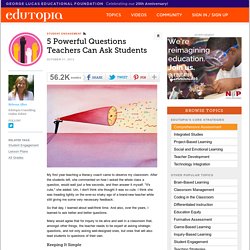
After the students left, she commented on how I asked the whole class a question, would wait just a few seconds, and then answer it myself. "It's cute," she added. Um, I don't think she thought it was so cute. I think she was treading lightly on the ever-so shaky ego of a brand-new teacher while still giving me some very necessary feedback. So that day, I learned about wait/think time. Many would agree that for inquiry to be alive and well in a classroom that, amongst other things, the teacher needs to be expert at asking strategic questions, and not only asking well-designed ones, but ones that will also lead students to questions of their own. Keeping It Simple I also learned over the years that asking straightforward, simply-worded questions can be just as effective as those intricate ones.
. #1. This question interrupts us from telling too much. . #2. . #3. . #4. . #5. Common Core in Action: Teaching Critical Thinking and Questioning. Since being asked to pilot my school's first iPad 1:1 classroom, I've been working through a paperless project-based learning unit with my eighth graders.
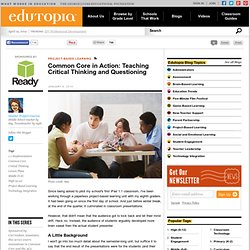
It had been going on since the first day of school. And just before winter break, at the end of the quarter, it culminated in classroom presentations. However, that didn't mean that the audience got to kick back and let their mind drift. Heck no. Instead, the audience of students arguably developed more brain sweat then the actual student presenter. A Little Background I won't go into too much detail about the semester-long unit, but suffice it to say that the end result of the presentations were for the students (and their superhero alter egos that they developed during our 1st quarter narrative unit) to present an advocacy speech to the United Nations. And, no, not the real U.N. What this did was prep the audience to listen to the advocacy speeches through the lens of what they knew about their country. מאמרים / הפדגוגיה של השאילה - יורם הרפז.
המאמר מציג גישה להוראה המבוססת על שאילת שאלות להורדת המאמר השאילה – הפעילות של יצירת שאלות – היא תכונה אנושית מובהקת.
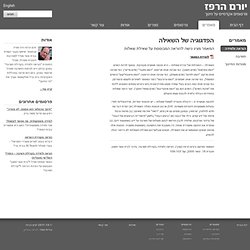
Educational Technology and Mobile Learning: The 6 types of Questions your Students Need to Know about. Learning is all about asking questions and finding answers to them.
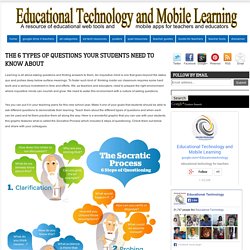
An inquisitive mind is one that goes beyond the status quo and probes deep below surface meanings. To foster such kind of thinking inside our classroom requires some hard work and a serious investment in time and efforts. We, as teachers and educators, need to prepare the right environment where inquisitive minds can nourish and grow. For Students, Why the Question is More Important Than the Answer. Thinkstock In a traditional classroom, the teacher is the center of attention, the owner of knowledge and information.
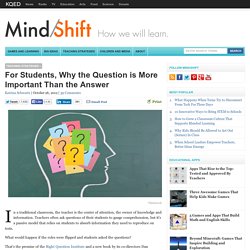
Teachers often ask questions of their students to gauge comprehension, but it’s a passive model that relies on students to absorb information they need to reproduce on tests. What would happen if the roles were flipped and students asked the questions? That’s the premise of the Right Question Institute and a new book by its co-directors Dan Rothstein and Luz Santana. A Primer In Effective Questioning Strategies For Classroom & eLearning - By Rosa Fattahi, WizIQ The Importance of Questioning in the Learning Process Since the ancient days of philosopher Socrates, asking questions has been a critical part of the teaching and learning process.
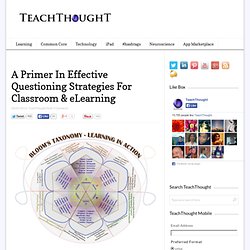
The well-known question-and-answer technique that Socrates employed with his pupils demonstrated how well dialogue and discourse work to stimulate students, encourage more complex thinking, and help them learn. For educators, verbal questioning also helps foster a sense of community in the classroom and keeps students engaged in the instructional process. A Primer In Effective Questioning Strategies For Classroom & eLearning - Educational Technology and Mobile Learning: The 6 types of Questions your Students Need to Know about. 5 Powerful Questions Teachers Can Ask Students. For Students, Why the Question is More Important Than the Answer. Questioning Toolkit.
Essential Questions These are questions which touch our hearts and souls.
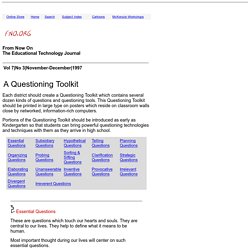
They are central to our lives. Questioning Techniques: Research-Based Strategies for Teachers — Energy and the Polar Environment. Questioning techniques are a heavily used, and thus widely researched, teaching strategy.
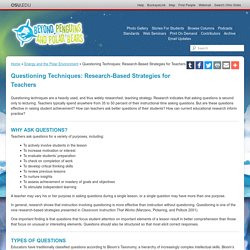
Research indicates that asking questions is second only to lecturing. Teachers typically spend anywhere from 35 to 50 percent of their instructional time asking questions. But are these questions effective in raising student achievement? How can teachers ask better questions of their students? How can current educational research inform practice? Teachers ask questions for a variety of purposes, including: To actively involve students in the lessonTo increase motivation or interestTo evaluate students’ preparationTo check on completion of workTo develop critical thinking skillsTo review previous lessonsTo nurture insightsTo assess achievement or mastery of goals and objectivesTo stimulate independent learning A teacher may vary his or her purpose in asking questions during a single lesson, or a single question may have more than one purpose. Effective Questioning Strategies.
Questioning Techniques Questioning is one of the most important dimensions of teaching and learning.
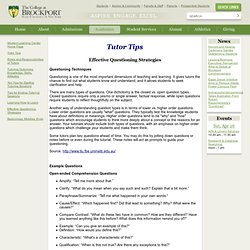
It gives tutors the chance to find out what students know and understand, and it allows students to seek clarification and help. There are many types of questions. One dichotomy is the closed vs. open question types. Closed questions require only a yes/no or single answer, factual response, while open questions require students to reflect thoughtfully on the subject.
RTDI - Questioning Strategies. Center for Teaching and Learning. 4Questioning_Ideas_to_use_in_classroom. Questioning Strategies. Questioning Strategies. Encouraging Students to Question - Finding Common Ground. There Are No Stupid Questions, But... - Coach G's Teaching Tips. Teacher Tech Talk » Blog Archive » The Socratic Process – 6 Steps of Questioning (infographic) Questioning Strategy.